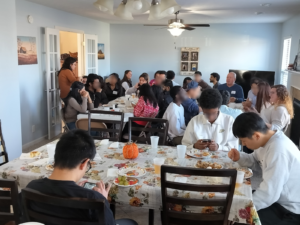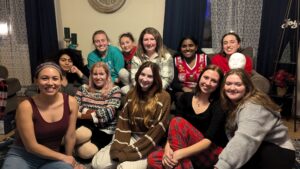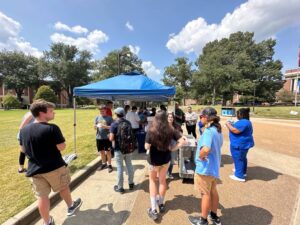Enjoy this blog post by Robert Turner, our Emerging Regions Collegiate Consultant, as he reminds us of the potential that lies within the college students to which we minister.
I would like to tell a story, a story that at first may seem to have nothing to do with our work with college students, but one I think has a lot to say about our work with college students.
In May of 2012, my high school class, 1975 graduates of Parkin, Arkansas, got together for a long-delayed reunion. Through the miracle of Facebook we were able to find each other after so many years. We were a small class from a small school from a small town in rural Arkansas who had experienced the enormous social changes that integration brought about to America in those years. Our little town was split down the middle between the white part of town and the black part of town, and our segregated lives rarely intersected until 1971 when integration took place.
This change was evident in our reunion, which was organized by both black and white alums of our class, and which included an equal number of former classmates from “both sides of town.” We greeted and hugged each other and caught up with each others’ lives as the long lost friends we were.
The speaker for our reunion was our football coach, beloved and respected in our youth and whom we were delighted was still around to be our special guest. When Coach Floyd got up to speak, he shared the usual funny stories from his days as a coach, with plenty of embarrassment to go around for many in the room. But we were totally unprepared for the most important point he wanted to make.
“When we (the faculty and staff) were preparing for integration, you will all remember the problems many towns and schools in our area went through. There had been fights, riots, and all kinds of issues. Everyone was on edge. We held meetings, drew up plans, and did everything we could to make sure this would be a successful transition. But ultimately, it all came down to how you kids would respond to all this. We had no control over how you would handle the challenge put on you.”
“To our amazement and delight, you kids went about your business, made new friends, did your studies, and did the usual things adolescents do. We had our usual behavioral issues that happen every year. But there were no racial incidents. Not one. You made friends, black and white, and got along. You kids just made it happen.”
“The thing I want to tell you now, that we really couldn’t tell you then, was that you kids were our heroes. Seriously. It was the most amazing thing I’ve ever seen. You showed us adults that we could move forward with change, and when we watched how all of you lived your lives together, you gave us hope, and we knew everything was going to be okay.”
Young people as heroes. A novel idea? I don’t think so.
Dr. Tom Logue, long-time State Director of Student Ministries in Arkansas, said many times that his proudest moment as a college minister was in 1957 at the annual state BSU Convention. Little Rock Central had integrated that fall with raucous social backlash by those opposed to the mixing of the races. Unfortunately, Arkansas Baptist churches and leaders were silent on the issue. But at the BSU Convention that fall, the students drafted a resolution in support of integration and passed it overwhelmingly, being the very first Baptist body to publicly support the change. Heroes.
Stephen Ambrose, in his book Citizen Soldiers, recounted that by the last months of World War II when the Allies were moving across Europe toward Germany, most of the veteran bomber pilots and crews by that time had been killed or decimated. Most of what remained were the new recruits. So in many cases men as young as 19 or 20, only two years removed from high school and adolescence, piloted the waves of bombers that liberated Europe from the Nazis. And we all know how that turned out. Heroes.
Patrick’s efforts in the fifth century to evangelize pagan Ireland were aided by young adults, dedicated men and women who risked everything. In August of 1806 five college students in Massachusetts, sheltering from a storm under a haystack, earnestly prayed for God to use them to evangelize Asia. God heard their prayers, and their efforts helped shape the American global mission movement. Through Christ, heroes all.
I am the product of a BSU in Ohio in the late 1970s that had a regional campus minister but no local director, so we had to do it all. And so during those years without a director, we organized mission trips, raised money for missions, led our fellow students to Christ and discipled them in the faith, assisted churches in their ministries to teenagers, put together a great worship choir, and made Christ known on our campus. During those three years that ministry, led by students, produced about a dozen summer missionaries, three US-2ers, two Journeymen, and several who followed a call of God into vocational ministry, including me, who was privileged to be a fellow laborer alongside such choice servants, who remain to this day my heroes in the faith.
Every one of us has stories of students we’ve been privileged to know and disciple who’ve taken courageous stands for Jesus. Those who have served as summer missionaries in challenging settings, those who have taken firm stands for Christ in the midst of campus debauchery, and those who’ve fought for justice in the name of God’s righteousness. Today we see a new generation of students passionately standing against human trafficking, and I am certain many of those who will take that battle across the globe in the years ahead are on our campuses today. Heroes.
So what does all this have to do with our ministry to college students? Simply, that we should never, ever underestimate the potential young people have to be used of God to make a difference in their world. And not just in the future, but now. While they are still young, and before they are told what they cannot do.
I’m pretty sure I’m preaching to the choir here, for those of us called to minister to students are aware every day that God has given us the privilege of living in the presence of the best and brightest among us, heroes aplenty, both present and future.
“Let no one despise your youth; instead, you should be an example to the believers in speech, in conduct, in love, in faith, in purity.”— I Timothy 4:12
Robert Turner
National Emerging Regions Collegiate Consultant
Director of Collegiate Ministries, Pennsylvania/South Jersey





